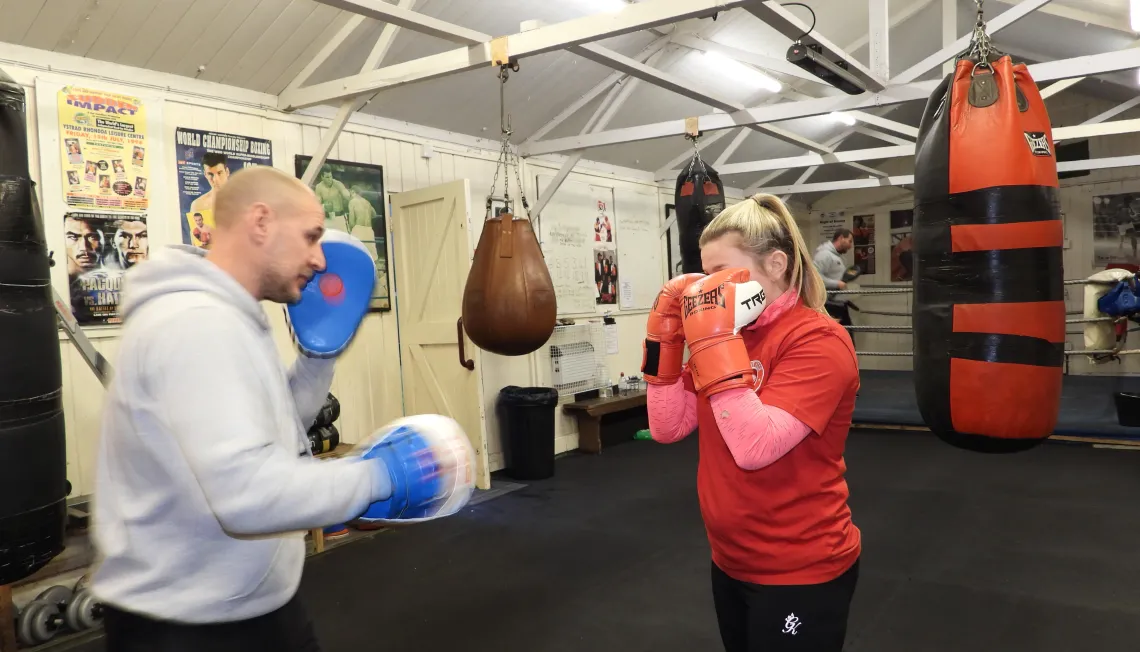We spoke to Martin Bewick, a Specialist Antisocial Behaviour Liaison Officer and the Right Hook Project Coordinator at Cwm Taf Youth Offending Service, to learn more about how boxing and martial arts can be vehicles for engaging young people.
About Right Hook
Right Hook is a project set up in 2019 by Martin at Cwm Taf Youth Offending Service (YOS), after seeing similar projects affiliated with Fight For Peace. The project caters for young people between the ages of 12 to 17, who are residents of Rhondda Cynon Taf and Merthyr, or who are under the responsibility of Rhondda Cynon Taff / Merthyr local authority.
How it works
The project uses boxing and martial arts as a way of engaging young people in personal development sessions as a method of early prevention and diversion away from contact with the criminal justice system.
The project, being part of the YOS, also leverages its existing contacts and provides referrals and signposting to other services such as housing and benefits advice, amongst others, as and when issues are discussed by the service users.
Referrals
To begin with, young people are referred to Right Hook by agencies such as the Youth Offending Service, police, schools and social services. The referral criteria are divided into four subcategories: behaviour criteria (anti-social behaviour/offending, school exclusion, risk-taking), offending criteria (Community Restorative Disposal, Youth Caution or Youth Conditional Caution), emotional/mental wellbeing criteria (adverse childhood experiences, high anxiety, etc.) and resilience criteria (low self-esteem and confidence, socially excluded/poor relationships, low achiever). The person referring must seek parental/carer consent and then discuss the young person’s needs with a Right Hook coordinator before engaging with the course.
The sessions
During the programme, the young people are put in groups of similar ages or if it is a school group, with their school. They complete 12 weeks of boxing sessions. Each session is followed by an informal meal during which programme leaders, volunteer staff from the youth offending and family services, coaches and young people sit and talk about topics they have chosen together in the first introductory session. The topics range from offending/antisocial behaviour, drugs and alcohol and gang violence to healthy eating, relationships and COVID. The conversations are unstructured and open for everyone to contribute, with no one specifically in charge. Eating together after training has the additional function of ensuring that certain service users have access to meals where otherwise they would not.
The training session is used as a way to break down barriers between the young people and the team and visitors, such as police officers. This encourages an environment of mutual respect and hard work which can then be carried into the community outside of the training sessions. It also creates a sense of achievement and belonging for the service users.
Adapted training sessions, with lowered to no music and fewer people, are also run for young people with Autism Spectrum Disorder.
Mentoring and evaluations
At the end of the 12 weeks, the young people can also become mentors on the programme, to continue their involvement and take part in the delivery of the service for the next cohort. They are also supported if they decide to compete.
Service users fill out an evaluation at the end of the programme. So far in 2022, 93 young people have been referred to the service. This includes 68 males and 25 females. 60 were referred by the YOS, whilst the remaining 33 were referred by schools.
Challenges
Martin sees inconsistent and scarce funding as a major obstacle to the project’s success, limited in part by being a statutory authority and based in a more rural area.
Future
The sessions currently take place in halls, community centres, schools and any other suitable place the project is able to source. Right Hook hopes to find the funding to set up a permanent community hub in Pontypridd. This is a strategic area to which many people have access.
They hope that the community hub will serve as a permanent place, open during the day as well as the evening, for service users to access. Ideally, it would have a gym space as well as a leisure area, a kitchen, a classroom for young people to access education or training and a drop-in area to get advice. The aim is to involve service users in aspects of managing the hub, such as decoration and contributing ideas for development. The Hub will enable the project to provide more complete support such as psychologists and other specialists, as well as training, education and personal and life skills development.
Further, having a permanent hub will allow the project to extend its referral service to peer referrals, as currently avenues are limited due to a lack of capacity and a stable place from which to run the service.
Testimonials
“I am grateful for everything everyone at Right Hook has done for me, and how it's helped me as a person.
I have someone to talk to and [am] able to take my anger out with zero consequences.”
Grace, 14 years
“It was helpful as I could speak about my problems.”
Keeton, 15 years
For more information about the project, please contact Martin directly:
martin.c.bewick@rctcbc.gov.uk
01443 827381
07786 523669
Case study by Isabella Anderson, 2022.
